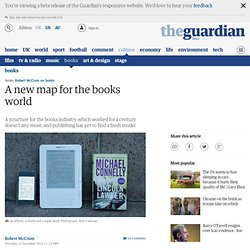

Institute for the Future of the Book. The Future of Publishing: An interview with Rebecca Swift. Posted by Tom Chivers on 19/3/12 Ahead of their major conference in June, Free Word's Tom Chivers speaks to Rebecca Swift of The Literary Consultancy about self-publishing, technology and the importance of the editor. Can you tell me a little of your story, and how you got into literature? I did an English degree at university and like all other literature graduates didn’t know what to do with myself. So I did a bit of journalism, and was lucky to get a part-time job at Lokamaya Press which published work in translation from Urdu and Hindi. After a couple of years I got a job at Virago Press and became a junior editor.
Writers would tell me on the phone that they wanted an opinion on their work from the publisher. I began to understand that publishing is a business that has to work economically, and editors couldn’t publish anybody that they took a fancy to. Is that when you decided to establish The Literary Consultancy (TLC)? It’s the most amazing thing I’ve done. Absolutely. A new map for the books world. At the end of the first decade of the 21st century, book publishing finds itself trapped in a perfect storm of economic and technological crisis.

Many people, from many different perspectives, have begun to question and challenge the role of the publisher. The social network, desktop publishing and digital technology have liberated all kinds of new potential. Would-be writers and literary promoters the world over have begun to say (and in some cases to demonstrate) yes, we can (do it ourselves). Such assertions have acquired weight thanks to the global recession. When times are hard, people look for alternative solutions. Whatever the causes, these discontents certainly challenge the publisher's traditional role, which mainly evolved during the 20th century.
(Full disclosure: my roughly 20-year experience as editor-in-chief of Faber & Faber, a medium-sized literary publishing house based in London, colours my response to this, but also, I hope, adds some benefit of experience.) 21st-century publishing builds on a healthy radical tradition. Unbound: the revival of subscription publishing Justin Pollard, one of the founders of Unbound, first got the idea for a radical new model for book publishing while sitting in the pub with his friend and fellow author Dan Kieran.

"In the way that writers do, we were having a good old moan about publishers and how they don't get any publicity for their books, and how advances are getting ever smaller," he recalls. "I mean, friends of ours, established authors, were getting advances of £4,000. That's a nice amount for a hobby, but not for a proper job. " Yet at the same time, Pollard and Kieran observed that book sales were hardly in freefall. Pollard and Kieran (by now working with the company's third co-founder, John Mitchinson) decided that there had to be another way of doing things. From the yoking together of these two ideas – online pledging in the music business, and old-fashioned subscription publishing – Unbound Books was born.